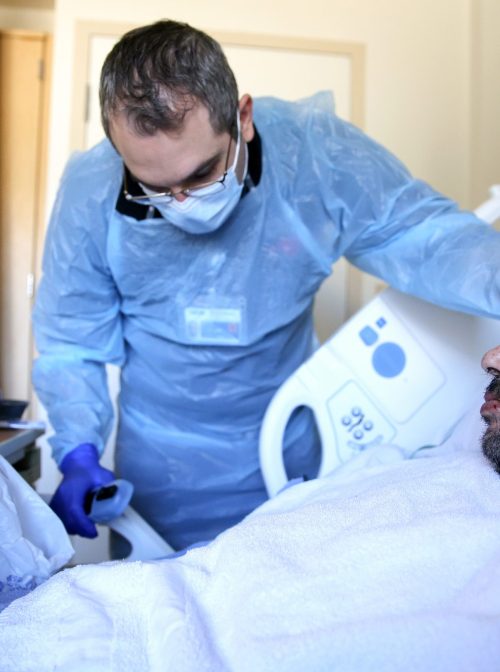Almost exactly a year ago, The Los Angeles Times ran a remarkable story on the work of Kevin Deegan, a chaplain at Providence Holy Cross Medical Center in Mission Hills, in the first year of the COVID pandemic.
Accompanying the article were photos by the award-winning photographer and Pulitzer finalist Francine Orr. All the photos are gut-wrenching, but one stands out for who is in the frame. While an unseen family says their last words to a father dying of COVID, Chaplain Deegan stands at a respectful distance, partially behind the room’s privacy curtain. His hand rests gently on the shoulder of Dr. Marwa Kilani. She is slightly slumped against the door, her eyes downcast.
For chaplains, it is not unusual to be present while a family says goodbye to their loved one. But Dr. Kilani could have left. She had other patients to care for, patients who were not already dying. She did not have to stay to witness the grief of a wife and daughter saying goodbye to their husband and father through the unnatural barriers of personal protective equipment. But Dr. Kilani stayed, standing beside the chaplain—holding space for a transcendent, spiritual moment of transition.

She was aware of the spiritual implications of what she was witnessing, and we at the Chaplaincy Innovation Lab want more clinicians to have this awareness, to understand the vital importance of spirituality to patients and families. Spirituality is not some hidden preference that those in healthcare settings “check at the door.” Instead, they bring spirituality — whatever that means for each individual — with them to their illness, their injury, their need to be healed.
For this reason, the Chaplaincy Innovation Lab recently began offering what we call Spiritual Generalist Training. This brief program trains clinicians to better understand the significance of spirituality for many patients, to conduct basic “spiritual assessments”— as one does for physical health — and to provide referrals to “spiritual specialists,” or chaplains, when warranted.

[Patients] bring spirituality — whatever that means for each individual — with them to their illness, their injury, their need to be healed.
Our spiritual generalist training developed from origins in pediatric care at Boston Children’s Hospital, to application in geriatric settings at Hebrew SeniorLife in Roslindale, to general healthcare applicability across the country. Those who have completed the program have reported significantly increased confidence in skills vital to the overall well-being of patients, including:
- increased ability to identify patients in states of both spiritual well-being and spiritual distress
- documenting spiritual strengths in the medical record and discussing them with the healthcare team
- developing care plans that incorporate patients’ spiritual needs.
Trainees have also reported enhanced recognition of how spirituality affects patients’ healthcare decisions and when the skills of a spiritual specialist, or chaplain, are needed. Some who have undergone training as spiritual generalists have mentioned reframing their entire approach to patients and families; one provider said “The concepts of being a spiritual generalist have been integrated into my conversations when I speak … one on one, especially when I ask them what really matters to them.”
Another pointed to situations where the intersection of patients’ spirituality and the benefits of spiritual care were clear: “I have referred more patients to chaplaincy over the last few months[,] including a mother who presented with postpartum depression and a teen with a new eating disorder.” Clearly, recognition of spirituality and recognition thereof is of vital importance in healthcare, especially in moments of transition or emotionally fraught diagnoses.
While the short-term goal of our spiritual generalist training is to increase the number of healthcare practitioners who are aware of spiritual needs in clinical settings, the program also advances a longer-term priority: greater awareness of the reality of spiritual needs and the importance of spiritual care more broadly. One way the Chaplaincy Innovation Lab advances this goal is its series of free, public webinars on a variety of topics which you can learn about on our website.
Michael Skaggs, PhD is Director of Programs of the Chaplaincy Innovation Lab. He is also the host and producer of the Lab’s webinar series and editor of the Lab’s written publications. He was previously Director of Communications at Transforming Chaplaincy.
Trained at the University of Notre Dame as a historian of American religion, Michael’s original work and book reviews have appeared in Sociology of Religion, American Catholic Studies, American Jewish Archives Journal, International Journal of Maritime History, U.S. Catholic Historian, Books & Culture, and elsewhere. He serves on the Historical Preservation Commission of South Bend – St. Joseph County, Indiana.




